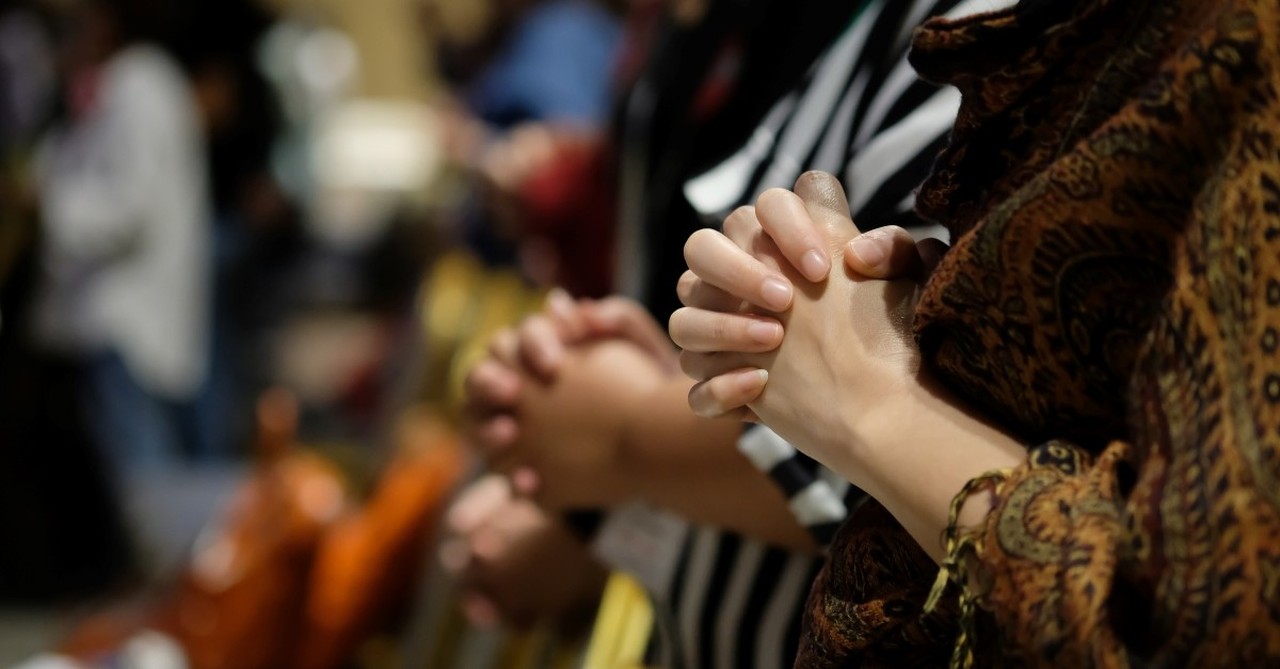7 Things the Bible Says about Rudeness and Etiquette

Rudeness is common in our fallen world. Many people react to stress by being rude, and arguments hurt and divide people both in person and online. But no matter how stressful our lives can get, there’s no excuse for being rude. The Bible gives us clear guidance on how we should treat one another. Bible etiquette boils down to treating other people well. God treats us with love and respect, and he calls us to follow his example in our relationships with other people. When we make an effort to avoid being rude as we interact with people, we can represent Jesus well and help people see the positive difference our faith makes in our lives. Here are 7 things the Bible says about rudeness and etiquette.
Photo credit: ©Getty Images/SDI Productions
1. Love is not rude.

1. Love is not rude.
SLIDE 1 OF 7
One of the most well-known Bible passages about love is 1 Corinthians 13, which is often read at weddings because of how it describes love. Verses 4-6 point out: “Love is patient and kind; love does not envy or boast; it is not arrogant or rude. It does not insist on its own way; it is not irritable or resentful; it does not rejoice at wrongdoing, but rejoices with the truth.” That highlights how rudeness is the opposite of love. When we’re rude, we put ourselves ahead of other people. We may interrupt them, ignore their feelings, or speak harshly without concern. But real love motivates us to treat others with dignity. God calls us to be loving in all situations, even when we disagree with people.
Biblical etiquette is all about showing other people that they matter. God wants us to avoid being rude not just so we can show people good manners, but also so God’s love can flow through our lives and into other people’s lives. By choosing love over rudeness, we can live out God’s most important commandments well. Mark 12:29-31 records how Jesus answered a man who asked him which of God’s commandments is the most important: “‘The most important one,’ answered Jesus, ‘is this: ‘Hear, O Israel: The Lord our God, the Lord is one. Love the Lord your God with all your heart and with all your soul and with all your mind and with all your strength.’ The second is this: ‘Love your neighbor as yourself.’ There is no commandment greater than these.”
Love transforms our perspective so we can treat others in ways that build them up instead of tearing them down. When we put love into action, we become motivated to help others instead of being rude to them.
Photo credit: ©GettyImages-Rawpixel
2. Kind words heal people, but harsh words hurt people.

2. Kind words heal people, but harsh words hurt people.
SLIDE 2 OF 7
Words have tremendous power, so it’s important to choose them carefully. Proverbs 15:1 says: “A gentle answer turns away wrath, but a harsh word stirs up anger.” Rude language can cause conflicts and ruin relationships, while choosing kindness when we speak can calm down even the most stressful situations.
James 3:5-6 and 8-10 cautions us that rude words can be dangerous, and urges us to pay attention to how we speak to other people, who are made in God’s likeness: “… the tongue is a small part of the body, but it makes great boasts. Consider what a great forest is set on fire by a small spark. The tongue also is a fire, a world of evil among the parts of the body. It corrupts the whole body, sets the whole course of one’s life on fire, and is itself set on fire by hell. … no human being can tame the tongue. It is a restless evil, full of deadly poison. With the tongue we praise our Lord and Father, and with it we curse human beings, who have been made in God’s likeness. Out of the same mouth come praise and cursing. My brothers and sisters, this should not be.”
Even brief rude comments to other people can lead to big problems in our relationships. God wants us to speak in ways that show self-control. Since self-control is a fruit of the Spirit (Galatians 5:23), we can ask the Holy Spirit to help us think before we speak and choose the best words to communicate what we want to say. Using kind words can help other people feel safe with us, which will motivate them to listen to our perspectives. Our tone matters just as much as the content of our messages. When we speak kindly, we follow the example Jesus set for us. Jesus didn’t respond to rude people with more rudeness. Instead, Jesus spoke to everyone with grace and compassion. The more we choose kind words, the more we can enjoy healthy relationships with other people.
Photo credit: ©GettyImages/millann
3. Jesus calls us to treat others as we want to be treated.

3. Jesus calls us to treat others as we want to be treated.
SLIDE 3 OF 7
An etiquette practice called the Golden rule comes from Jesus’ advice in Luke 6:31: “Do to others as you would have them do to you.” That’s simple to do, yet it can make a significant positive impact on all of our relationships. Day by day, we should remind ourselves that if we don’t want others to be rude to us, then we shouldn’t be rude to them. Etiquette is built on mutual respect. Since we appreciate being listened to, spoken to kindly, and treated with respect, then we should treat others in the same ways. If we catch ourselves in stressful situations starting to be rude, we can stop and pray silently for help from the Holy Spirit to make better choices in real time.
The Holy Spirit is always available to help us. Even when we don’t know how to pray about something, the Holy Spirit will intercede for us, as Romans 8:26 reveals: “… the Spirit helps us in our weakness. We do not know what we ought to pray for, but the Spirit himself intercedes for us through wordless groans.” While being rude might feel satisfying in the moment when we’re talking to people who have hurt us, rudeness goes against the Golden Rule. Jesus calls us to rise above our anger and respond with grace and mercy. Living by the Golden Rule reminds us that every person is made in God’s image and deserves to be treated with respect. When we treat others as we want to be treated, we’ll enjoy peace and goodwill in our relationships.
Photo credit: ©GettyImages/Nortonrsx
4. God will bless us when we choose humility over pride.

4. God will bless us when we choose humility over pride.
SLIDE 4 OF 7
Bible etiquette also emphasizes being humble. Philippians 2:3-4 advises us: “Do nothing out of selfish ambition or vain conceit. Rather, in humility value others above yourselves, not looking to your own interests but each of you to the interests of the others.” Rudeness often comes from pride. If we think we’re better, smarter, or more important than someone else, it’s easy to dismiss their feelings and act rudely toward them. But if we’re humble, we can see that we’re all equally valuable from God’s perspective. We need humility to follow the Bible’s etiquette, because etiquette involves caring how our actions affect others. When we choose humility over pride, we listen to people and carefully consider how to act in ways that won’t unnecessarily hurt them.
Even though Jesus was God, he humbled himself to serve others. Jesus washed his disciples’ feet and ate with people who were outcasts from society. If we follow Jesus’ example, we’ll find ways to serve people rather than being rude to them. God will bless us when we do! The Bible promises us in 1 Peter 5:5-6: “… All of you, clothe yourselves with humility toward one another, because, ‘God opposes the proud but shows favor to the humble.’ Humble yourselves, therefore, under God’s mighty hand, that he may lift you up in due time.”
Photo credit: ©Getty Images/Curly_photo
5. Treating people well is an important part of shining our spiritual light.

5. Treating people well is an important part of shining our spiritual light.
SLIDE 5 OF 7
In the darkness of this fallen world, it’s important to shine the spiritual light that God has given us, by pointing people to the hope they can find through relationships with Jesus. In Matthew 5:16, Jesus urges us: “Let your light shine before others, that they may see your good deeds and glorify your Father in heaven.” The way we behave in public is an important part of our witness as Christians. If we treat people rudely, we risk pushing them away from faith. But when we treat people gracefully (like God treats us), we point others to Jesus.
Good etiquette can help us share the Gospel well with people. So, let’s do our best to be respectful and caring in all of our interactions with others, both in person and online. We can listen to people, thank them, smile at them, and encourage them. We can help people feel safe, respected, and loved. We can post only positive comments online. God wants us to become bright beacons of hope for people, as much as possible.
Photo credit: ©Getty Images/Jose Luis Pelaez Inc.
6. We need to forgive quickly and not retaliate when people hurt us.

6. We need to forgive quickly and not retaliate when people hurt us.
SLIDE 6 OF 7
Rudeness can be a reaction to someone else’s bad behavior. If someone makes a rude comment to us or does something rude like cutting us off in traffic, it’s natural to feel tempted to react with rudeness ourselves. But the Bible tells us not to repay evil with evil. Instead, God calls us to be peacemakers, and that may involve letting go of the last word in arguments. Romans 12:17-18 cautions us: “Do not repay anyone evil for evil. Be careful to do what is right in the eyes of everyone. If it is possible, as far as it depends on you, live at peace with everyone.” We need to break the cycle of negativity when other people are rude to us. One vital way to do so is by choosing to love and forgive our enemies. If we hold onto grudges or plan ways to get back at someone, we hurt ourselves by letting bitterness poison our souls and distance ourselves from God.
The Bible teaches us in Colossians 3:13: “Bear with each other and forgive one another if any of you has a grievance against someone. Forgive as the Lord forgave you.” Since God has forgiven us for our sins, we should let our gratitude motivate us to faithfully follow God’s call to forgive other people who hurt us. We don’t have to worry about how to forgive, because God will help us do so if we just make the choice to forgive first. Also, forgiving doesn’t mean forgetting how we were hurt or saying that somehow that was okay. When we forgive, we’re just choosing not to retaliate against the people who hurt us, and to trust God to deal with the injustice of those situations.
Forgiveness blesses us along with others because it’s healing for us. When we forgive, we clear bitterness out of our souls, which is important for us spiritually. Being a peacemaker doesn’t mean being a pushover; it means choosing kindness over revenge and trusting God to handle justice in those situations.
Photo credit: ©Unsplash/Gus Moretta
7. We need to use our words to encourage people.

7. We need to use our words to encourage people.
SLIDE 7 OF 7
Since our words are powerful, the Bible says we should use them to encourage other people as often as possible. Ephesians 4:29 says: “Do not let any unwholesome talk come out of your mouths, but only what is helpful for building others up according to their needs, that it may benefit those who listen.”
Encouraging words build people up by giving them positive perspectives, pointing them to God, and inspiring them to grow spiritually. We should do our best to avoid unwholesome talk (which includes rudeness) and to build people up with our words whenever we have opportunities to do so. Even when we’re correcting people, we need to do so in graceful ways that are encouraging. Colossians 4:5-6 says: “Be wise in the way you act toward outsiders; make the most of every opportunity. Let your conversation be always full of grace, seasoned with salt, so that you may know how to answer everyone.” Every conversation we have is an opportunity to encourage those around us.
In conclusion, the Bible is clear that how we treat others matters. Rudeness is always wrong, because it’s unloving. But through the power of the Holy Spirit, we can learn how to relate to others as God relates to us. Paying attention to what the Bible says about etiquette helps us line up our choices with God’s love. By avoiding rudeness and embracing biblical kindness, we can shine God’s light in a world that urgently needs it. So, let’s do our best to let God’s love flow through our lives and into other people’s lives. We’ll all be blessed in the process!
Photo credit:Getty Images/NoonVirachada

Originally published August 18, 2025.






